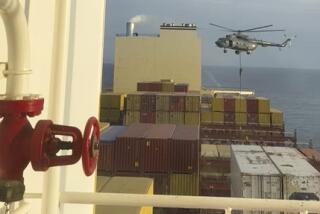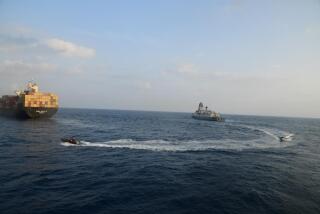Discord over gulf borders runs deep
- Share via
LONDON — Britain and Iran on Thursday hardened their positions in their dispute over 15 British sailors and marines captured in Persian Gulf waters that maritime experts say remain among the most disputed geographical boundaries in the world.
Both nations broadened their attack, with Britain winning a statement of “grave concern” over the detention from the United Nations Security Council and Iran releasing a new letter purportedly written by Leading Seaman Faye Turney that injects the issue of the war in neighboring Iraq.
“Isn’t it time for us to start withdrawing our forces from Iraq and let them determine their own future?” says the letter, addressed to Britain’s Parliament.
Tehran displayed charts and satellite readings on state television purporting to show that the small British rafts that had been patrolling the northern gulf near the mouth of the Shatt al Arab waterway had crossed into Iranian territory six times before being seized.
“We intend to find out the reason for their illegal entry into Iranian territorial waters,” said Ali Larijani, Iran’s national security council chief and its top nuclear negotiator.
Larijani said any British attempts to pursue the case through “media propaganda and political hue and cry” would cause delays in Iran’s original plan for an early release of Turney, the only woman among those being held.
Britain insists that its vessels were 1.7 nautical miles inside Iraqi waters when they were confronted by Islamic Revolutionary Guard gunboats. It is attempting to resolve the conflict through diplomatic channels.
“What you have to do when you are engaged with people like the Iranian regime, you have to keep explaining to them, very patiently, what it is necessary to do, and at the same time make them fully aware there are further measures that will be taken if they’re not prepared to be reasonable,” British Prime Minister Tony Blair told ITV News.
“The sooner the Iranian government realizes that there is no option that is open to them other than to release them, the better,” he said.
Britain, which on Wednesday froze diplomatic contact with Tehran on all matters save the naval personnel case, had hoped to add the weight of the Security Council to its demand for release of the sailors and marines. But after an all-day debate, the statement that emerged failed to “deplore” the detention or call for an immediate release of the captives. Instead, the council expressed “grave concern” at the capture and holding of the Britons, and appealed to Tehran to allow consular access.
Russia and others objected to the word “deplore” and the assertion that the British vessels were in Iraqi waters, and insisted on an “early resolution” instead of an “immediate release” of the personnel.
For Iran, a bilateral issue
Iran’s U.N. mission issued a statement criticizing Britain for involving the Security Council in what Tehran considers a bilateral issue. It called the effort “unacceptable, unwarranted and unjustifiable.” It also said “Iran abides by its moral and legal commitments as regard[s] the treatment of the detainees. All detained British marines and sailors are safe, well and in good health.”
Although British officials insist that there is no uncertainty over the position of either the British boats or the border, maritime experts say there is a long history of contention and uncertainty over territorial control in the northern Persian Gulf.
The waters are subject to widely agreed-upon international understandings but have never been subject to a treaty between Iran and Iraq, maritime experts say.
“I’m afraid to say there is no line at all. What these people are talking about is an imaginary thing,” said Pirouz MojtahedZadeh, an Iranian professor of geopolitics now living in London, who has studied the Shatt al Arab and its environs for 40 years.
“Neither side is at fault. The situation is such that anybody can make a mistake,” he said.
Craig Murray, who headed the maritime section of the British Foreign Office from 1989 to 1992, but later fell out with the government and quit, posted an allegation on his weblog that the boundary shown on the map British officials are using as a defense is “a fake with no legal force,” because there has never been an agreement on the actual border.
“Accepting the British coordinates for the position of both [the monitoring ship] HMS Cornwall and the incident, both were closer to Iranian land than Iraqi land,” he wrote.
The conflict is deeply rooted in history. Persians and Ottoman Turks fought over the marshy delta lands at the head of the Persian Gulf for years before coming to a vague agreement in 1639. Three centuries later, in 1975, modern-day Iran and Iraq signed a treaty setting the boundary along the waterway known as the Shatt al Arab, a river that runs between Iraq’s Faw peninsula and Abadan Island in Iran.
Hussein shreds a treaty
But five years later, then-Iraqi President Saddam Hussein went on television and ripped up his copy of the accord. The war that ensued with Iran left the waters of the nearby Persian Gulf littered with wrecked and abandoned ships.
Authorities on maritime law say the 1975 treaty establishing the land border down the middle of the Shatt al Arab is considered the law but applies only to the river. Out in the gulf, imaginary lines have been drawn in the same general southeasterly direction as the river’s course to suggest a territorial boundary. Although the line has been commonly accepted for shipping purposes, it does not have the legal force of a treaty, most analysts say.
“The lateral maritime boundary between these two countries has not been fixed by a treaty. The only thing that we have over these years is a lot of state practice,” said Kaiyan Kaikobad, an associate professor of international law at Britain’s Durham University.
“If you can show that over a reasonably long period of time, that this was the line that both countries actually agreed on, there’s lots of rules in international law that allow that line to become not only a de facto line, but a de jure line.”
But that, Murray said in an interview, may be precisely what Iran is hoping to avoid by asserting its jurisdiction well into the gulf.
“There would be an argument that a country like Iran would be forced to act as it did,” he said. “Because only by challenging what is becoming a customary boundary could you do anything about it.”
On state television Thursday, Iran also listed six other occasions over the last three years on which it said British armed forces had committed “violations” of Iranian territory.
The British Defense Ministry said it could not confirm or deny the accounts.
Times staff writer Murphy reported from London and special correspondent Mostaghim from Tehran. Times staff writer Maggie Farley at the United Nations contributed to this report.
More to Read
Sign up for Essential California
The most important California stories and recommendations in your inbox every morning.
You may occasionally receive promotional content from the Los Angeles Times.










